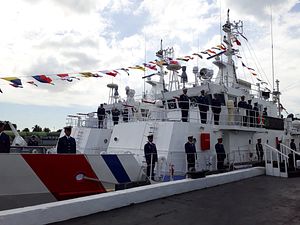Earlier this month, Japan held an expanded version of a maritime exercise with the Philippines that also included other Southeast Asian states and the United States. Though Tokyo’s role in capacity-building in the maritime security realm in Southeast Asia is far from new, the development was nonetheless significant as part of a broader trend of Japan’s deepening focus on this area bilaterally and multilaterally amid a range of challenges.
As I have noted before in these pages, though Japan has long been a key contributor to capacity-building for Southeast Asian states in the maritime security realm, these efforts have stepped up under Prime Minister Shinzo Abe. This includes not just boosting ties with individual states like the Philippines, but also strengthening ties with ASEAN as a whole (See: “Japan Reveals First ASEAN Defense Initiative with Vientiane Vision”). At the recent ASEAN Defense Ministers’ Meeting-Plus (ADMM-Plus) last month, Japanese Defense Minister Itsunori Onodera again reinforced the point that Japan would continue to take actions that would contribute to free and open seas, including joint training with the U.S. Navy and those of partner countries in the South China Sea.
One of the examples of Tokyo’s capacity-building with Southeast Asian states in the context of the Japan-Philippine relationship is the Maritime Law Enforcement (MARLEN) exercises (See: “Japan-Philippines Defense Ties in the Spotlight With New Vessels”). MARLEN exercises usually involve representatives from the Philippine Coast Guard (PCG) and Japan Coast Guard (JCG), along with Japan International Cooperation Agency (JICA) representatives, conducting exercises to develop the skills of PCG personnel in law enforcement to address a wide variety of challenges, including illegal fishing and piracy. The most recent iterations of the MARLEN exercises and related capacity-building have focused on areas such as high-seed boat drills as well as arresting techniques.
From November 7 to 16, the 15th iteration of the MARLEN exercise was held in Manila Harbor. This iteration of the exercise was longer than the more recent ones and also multilateral rather than bilateral, involving not just Japan and the Philippines but also coast guard personnel from three other Southeast Asian countries – Indonesia, Malaysia, and Vietnam – as well as Japan and the Philippines’ treaty ally, the United States. All three Southeast Asian states have a strong interest in the maritime domain, including the South China Sea, with Malaysia and Vietnam being claimants and Indonesia being an interested party (See: “Indonesia’s South China Sea Policy: A Delicate Equilibrium”).
The drills covered procedures such as pre-boarding and tactical maneuvering as well as operations such as pursuit, pincer control, and boarding other vessels. The PCG offered few details publicly about the specific nature of involvement of other states, merely noting that coast guards from the three other Southeast Asian countries participated in the drills and that U.S. Coast Guard personnel shared their expertise in outboard engine maintenance in the latter stages of the exercise.
To be sure, the trend of multilateralizing certain components or entire iterations of certain exercises or defense engagements is by far from unique to MARLEN, and the Philippines is no stranger to this as a treaty ally of the United States and a close partner of Japan (See: “Why the Philippines is Critical to the US Rebalance to Asia”). And as with other instances of this ilk, the key to watch will be whether expanded multilateral iterations will be institutionalized or whether they will continue to be carried out on an ad hoc basis for a while to afford them distinct advantages such as a lower profile as well as flexibility.
In his remarks during a visit to the PCG headquarters, Kentaro Sonoura, a special adviser to the prime minister who had also observed this iteration of MARLEN, framed Japan’s capacity-building efforts in Southeast Asia as part of several efforts by regional states to confront a wide array of challenges in Southeast Asian waters, from the Straits of Malacca to the Sulu-Sulawesi Seas. Given the level of activity we have already seen on these fronts as well as continuing interest there, developments such as this one will certainly be worth watching closely going forward (See: “A New US-China Role in the Sulu Sea Trilateral Patrols?“).































